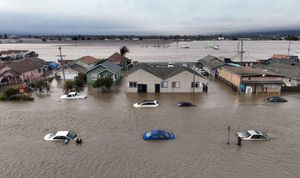Nigeria continues to grapple with significant socioeconomic challenges, evident through recent tragic incidents related to fuel tanker explosions and growing public discontent leading to protests against telecom tariff hikes. The National Orientation Agency (NOA) has raised alarm over the alarming rise of fatalities stemming from reckless scooping of fuel from overturned tankers. With incidents spreading across the nation, the agency decries the continued loss of lives due to these avoidable accidents, which have often turned deadly.
The latest tragedy struck Diko village, Niger State, where reports indicate multiple deaths due to incidents involving fuel leakage and subsequent explosions. Over 80 lives have been reportedly lost recently, including 18 fatalities from two separate incidents cited by Issa-Onilu, NOA spokesperson, who stressed, "Many Nigerians have lost their lives to fuel tanker explosions with the latest in Enugu State, claiming the lives of no fewer than 18 persons." These grim statistics highlight the danger posed by miscreants who not only steal petrol but also place themselves and emergency responders at risk.
Oyo State has also faced its share of distressing events. Firemen were assaulted by armed individuals at the Sabo Market, Orile Igbon, during their efforts to manage another tanker fire following its overturn due to tire blowouts. The tanker was carrying 33,000 liters of Premium Motor Spirit (PMS), and when it overturned, it led to both fuel spillage and immediate fire outbreaks. General Manager of Oyo State Fire Services, Revd Akinyemi Akinyinka, recounted the harrowing experience: “Our trucks were damaged, our men escaped death by whiskers.” Such encounters signify the increasing dangers faced by those tasked with maintaining public safety amid rising social unrest.
To address these incidents, NOA has initiated extensive public education campaigns against the scooping of petrol from crashed tankers. Issa-Onilu traveled to the Akinyele Trailer Park to engage with residents of Ibadan, where he remarked, “Scooping petrol was akin to stealing and was fraught with dangers.” The agency warns civilians to avoid these hazardous practices, stressing onlookers to run for their safety whenever they witness spillage, rather than getting involved. This preventative messaging aims at changing the attitudes surrounding these reckless behaviors and reducing the associated risks.
The socioeconomic fabric of Nigeria has been tested by these challenges, especially as communities report not only mourning lost lives but also lamenting economic impacts from these repeated crises. Tanker explosions have not just immediate consequences—they disrupt local economies and strain the nation’s infrastructure. The NOA has begun producing jingles and outreach materials across 70 languages, hoping to educate more people about the risks involved.
While addressing the fuel-related safety issues, Nigeria is witnessing another wave of protests gaining traction, this time against telecom companies planning to hike service tariffs. The Nigeria Union of Telecoms announced plans for nationwide protests scheduled for early February following widespread dissatisfaction with the telecom sector's pricing adjustments. With the rising cost of living, telecommunications have become integral parts of daily life, and any hike can significantly impact budgeting for many consumers.
This brewing discontent reflects broader economic frustrations felt across various sectors, adding to the socioeconomic challenges Nigeria faces. The protest aims to compel the government and service providers to reconsider their pricing strategies, expressing the citizens' resolve to assert their rights and demand accountability.
At the convergence of both these pressing issues—the tragic toll of fuel-related incidents and the growing unrest surrounding telecom tariffs—Nigerian society stands at a crossroads. It is evident these incidents underline severe systemic issues, including the need for more effective emergency protocols, community education, and responsive governance to deal with the economic realities of the Nigerian populace.
Discourse around these challenges reflects urgent calls for reform, as citizens fight for not just their safety on the roads, but also for fair telecommunications practices. The government and relevant agencies are now pressed to not only mitigate these dangerous practices but also address the concern of rising costs for basic services. Without immediate and sustained efforts to tackle these challenges, the risk of unrest may escalate as more individuals are drawn to the streets to voice their grievances.



